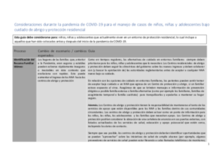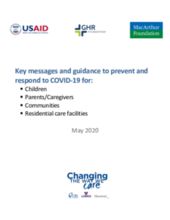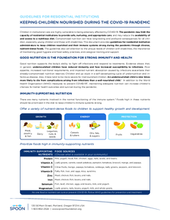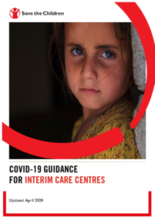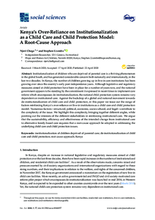Displaying 261 - 270 of 1510
The current study examined the attachment development of 92 internationally adopted Chinese girls, focusing on the influence of type of pre-adoption care (institutional versus foster care) and sensitive adoptive parenting.
Esta guía debe considerarse para: niños, niñas y adolescentes que actualmente viven en un entorno de protección residencial, lo cual incluye a aquellos que han sido colocados antes y después del inicio de la pandemia de COVID-19.
This guidance should be considered for children who currently live in a residential setting, including those that have been placed in residential care before and after the onset of COVID-19 pandemic.
This document features key messages including critical information about keeping children safe and healthy during the COVID-19 pandemic. The messages are designed for use by country child protection actors, such as public child protection officers, directors of residential care facilities and government and civil society actors that work with vulnerable children and families.
This study was carried out to determine the pattern of dermatological conditions and contributing factors among children living in orphanages in Dar es Salaam, Tanzania.
This document from the Spoon Foundation provides guidelines for residential institution administrators to keep children nourished and their immune systems strong during the pandemic through diverse, nutrient-dense foods.
This guidance is for Save the Children staff and partners already running Interim Care Centres (ICCs) during the Covid-19 pandemic.
This paper teases out the range of factors reinforcing Kenya’s over-reliance on live-in institutions as a child care and child protection model.
In order to be better equipped to design interventions aimed at improving the educational outcomes of children for whom society has assumed responsibility, this study seeks to further our understanding about which factors that contribute to the educational disparities throughout the life course.
This study aims to advance understanding of social workers’ perceptions of the circumstances necessitating and preventing the placement of children with disabilities (CwDs) in institutions.

